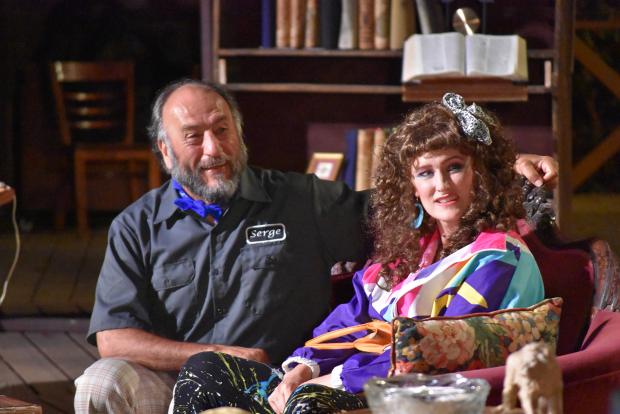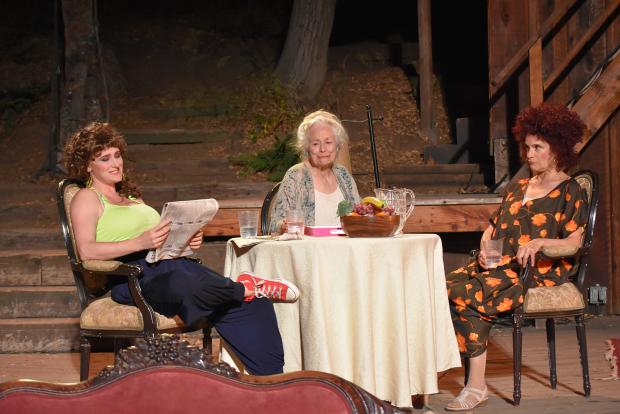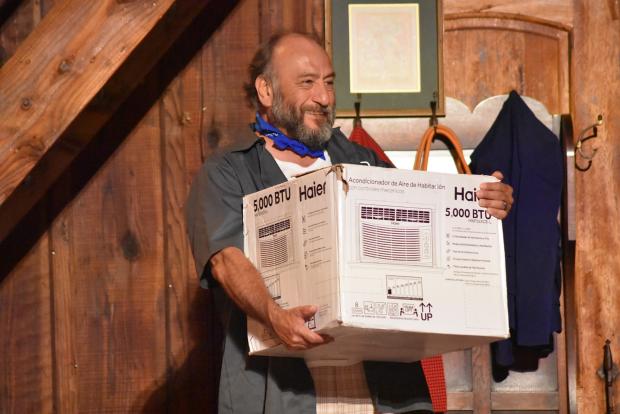In this day and age of superheroes deluging the big screen with their derring-do, it’s a delight to discover a production performed on the live stage about three very real women grappling with the various vicissitudes of everyday life. This revised revival of playwright Ernest Thompson’s The West Side Waltz is about a trio of females of different ages who reside in an apartment building on Manhattan’s West 72nd Street. The Waltz part of the title refers to the fact that widowed 70-ish Margaret Mary Elderdice (Ellen Geer) is a former classical concert pianist, while her 50-ish neighbor Cara Varnum (Melora Marshall) accompanies her on the violin for household duets. And I suppose that Waltz could also refer to the dance of life that this play poignantly choreographs on the outdoor stage of Will Geer’s Theatricum Botanicum.
30-something Robin Bird (Willow Geer) joins the duo after answering Margaret Mary’s ad placed on the bulletin board of what sounds like a LGBTQ-oriented NYC bookstore. An aspiring actress, lured by the promise of free rent in pricey Manhattan, Robin (the stage name she goes by instead of her actual Italian moniker) moves into the spare room of Margaret Mary’s apartment (visualized onstage by set designer/prop master John Eslick) in order to serve as her companion. She is out-of-sorts, trying to put the pieces of her lives back together after Robin’s husband has come out as gay and divorced her. Costume designer Beth Eslick’s slick wardrobe helps express wannabe thesp Robin’s eclectic personality and style.
Cara is described in a press release with an old-fashioned word as a “spinster,” and the play hints at the possibility that she has actually remained a virgin. In any case, she lives alone (except, but of course, for her cat) and is lonesome. Thus, her frequent forays to the apartment of her older friend, whom Cara holds in high esteem. Together they perform a number of classical pieces, including Johann Strauss’ “The Blue Danube” waltz and Beethoven, to pass the time and liven things up. The pieces all seem taped, with the music compilation and sound design by maestro Marshall McDaniel.
A fourth character appears from time to time in the first and second acts at the apartment – the building’s super, Serge America, an immigrant from an unidentified country and who mightily does battle with with the ancient apartment house’s aging boilers, air conditioners, etc. In the program Miguel Perez is credited with the role of Serge, but on the night I attended Waltz, the role of Serge was played by A.M. Sannazzaro, who can also be seen this summer in repertory at WGTB’s The Merry Wives of Windsor.
According to press notes, Ernest Thompson refers to his play as “a comedy, and… a relationship, character-oriented piece.” It is similar to his best-known work, the play and motion picture On Golden Pond, in that Waltz delves into and depicts the interactions between human beings and their relationships. However, the plots diverge, as Pond focuses on an older married couple (as well as a fraught father-daughter dynamic), while Waltz highlights single women of various ages.
But despite their differences, Thompson also dares go where angels and most dramatists fear to tread, the dreaded topic of aging, and as in Pond, does so with great sensitivity again with Waltz. The play covers, I suppose, several years, and Margaret Mary’s aging and the passing of time is cleverly visualized by the various instruments she uses to help her get around her apartment, where the entire onstage action takes place.
I have to say that it is really great to not only see a production dominated by women (Waltz is even female-directed by Mary Jo DuPrey, who previously helmed another character-driven play with strong roles for women at WGTB, August: Osage County), but one wherein a white-haired senior citizen is the protagonist. Hollywood flicks may be dominated by action heroes soaring through the sky, but in the real if more mundane day-to-day world, it often takes a “superhero” to just be able to walk across a room or arise from a fall. Being enabled to persist in the face of advancing age and to continue to find purpose and meaning in life over the passage of time – now that’s the stuff that real life super powers are made of, and Ellen Geer uplifts us all with her moving performance of a character who is roughly her own age. Geer, who is also WGTB’s Artistic Director, arguably delivers a tour de force rendition that is worthy of her voteworthy counterparts: Katharine Hepburn, who played Margaret Mary on Broadway in 1981, and Shirley MacLaine, who incarnated the part in the 1995 TV movie version.
But in addition to the interpersonal relationships, this revival of Waltz adds a social dimension. In Act I the virginal violinist ventures forth into tenants’ rights organizing in order to improve conditions in the dilapidated building they live in. Her involvement in the tenants’ organization confers stature and meaning on the lonely Cara.
But Thompson infuses this latest iteration of Waltz with a whole new sense of purpose in the second act. The quirky Robin has been, seemingly randomly, clipping and filing articles from the newspaper, and she refuses to divulge why and what she’s up to to the nosy Margaret Mary. I half expected a sort of Carrie Mathison-like vision board or chart with strings, pins and pics from the great HBO espionage series Homeland to appear onstage, but it all finally makes sense when it turns out what Robin has been trying to document.
As Thompson said in a recent interview about this current revival at WGTB: “I call it a Deconstruction, not because I’ve put dynamite to the script but because, with the relative, shall we say, wisdom that sometimes comes with time and distance, I gave myself the freedom to ask the questions I couldn’t or couldn’t hear four decades ago. For instance, when I wrote the piece, AIDS was mostly a scary rumor. By the time we finished our tour, in the summer of 1982, AIDS didn’t have a name yet, other than Queer Cancer. Now, the dumb gay jokes that apparently seemed amusing in the early ’80s, have been replaced by the gravitas of that horrifying scourge, and AIDS has become a grounding, offstage counterpoint to the hilarity of the play. A similar deepening of all the relationships among the five vibrant characters has followed. I’m grateful for the invitation to have revisited The West Side Waltz and excited to share with a new audience a provocative evening in the theatre and one much closer to the author’s original intent.” (See: https://www.broadwayworld.com/los-angeles/article/BWW-Interview-Ernest-Thompson-On-The-Leading-Ladies-Hes-Worked-With-Reviving-His-THE-WEST-SIDE-WALTZ-20220613.)
So, in this new deconstructed rendition, Thompson’s reinvigorated Waltz waltzes over from Ibsen, O’Neill and Chekhov character-driven territory to a Bertolt Brecht and Clifford Odets-like social drama. Unbeknownst to her roommate and Cara, Robin has found romance with an attorney, Glen Darson (Charles Lin), and brings her beau back to the apartment for a dinner with Margaret Mary and Cara. The former voices concerns to Robin about Glen, after Robin announces the bird is leaving the nest to move in with Glen. But once Robin explains to the older woman that she met Glen following a rally to demand action and support for people confronted by AIDs as Pres. Reagan and much of the country turned a blind eye to the catastrophe, and that Glen is working pro bono to provide legal assistance to the cause, to her credit Margaret Mary starts singing a different tune.
By merging the character-driven interplay of individuals with a social drama offering a collective dimension, Thompson has matured as an artist. This is a complex process for a politically-engaged writer and director, and as far back as the 1920s the great Soviet film director V.I. Pudovkin sought ways to meld the mass and the individual in revolutionary movies such as his 1926 screen adaptation of Maxim Gorky’s novel Mother. Thompson’s 1988 movie about the anti-Vietnam War movement, 1969, also admirably succeeds in uniting the individual and mass.
Thompson adapted his play On Golden Pond for the silver screen for the 1981 movie of the same name, for which he won the Best Writing, Screenplay Based on Material from Another Medium Academy Award, while Katharine Hepburn and Henry Fonda likewise scored Oscars for their performances as the longtime married couple. The movie was also nominated for seven other Oscars, including Best Picture and Henry’s little girl, Jane Fonda, for Best Supporting Actress.
According to press notes: “Playwright Ernest Thompson has won an Oscar, a Golden Globe, a Writers Guild Award and a Broadway Drama Guild Award for Best Play. His work has been nominated for a Tony, an Emmy and a British Academy Award. His more than 35 plays have been seen in theaters around the world. The most enduring, On Golden Pond, has been translated into 30 languages and played in more than 40 countries on six continents. His other plays include A Sense of Humor (Jack Lemmon and Estelle Parsons), White People Christmas, (two wildly successful holiday runs at the Zephyr Theatre on Melrose), Ax of Love, Amazons in August, Murdering Mother, The Elixir and Human Beings. His soon-to-be-released anthology of 25 short plays contains the collections Political Suicide, The Penis Responds, Answers and Valentines for Two. His films include On Golden Pond (Katharine Hepburn, Henry Fonda and Jane Fonda), Sweet Hearts Dance (Susan Sarandon and Jeff Daniels), The Lies Boys Tell (Kirk Douglas), 1969 (Robert Downey Jr. and Bruce Dern), The West Side Waltz (Shirley MacLaine and Liza Minnelli), Out of Time, and the live On Golden Pond (Julie Andrews and Christopher Plummer), the last four of which Ernest also directed, as he has his latest films, Time and Charges and Heavenly Angle.”
With its smaller than usual cast for WGTB’s Shakespearean mass spectacles, and minus the swordplay and rope-swinging that often accompanies these classics, Waltz zooms in on the inner lives of its three female characters, brought fully alive by a trio of gifted actresses who also bring their real life relationships to bear on their roles. Ellen Geer and Melora Marshall are sisters, while Willow Geer is Ellen’s actual daughter. DuPrey deftly directs the trio, as well as the two men in supporting roles in this primarily female-centric story.
I attended Hunter College, located on the other side of Central Park from West 72nd Street, which enhanced my enjoyment of this heady concoction that ruminates on the aging process, the female of the species, friendship and extending that sensibility of solidarity out into our troubled world. In doing so, Thompson’s “deconstructed” version ennobles this well-written, well-directed, superbly acted Waltz on the not-so-blue Hudson River.
The West Side Waltz runs through Oct. 1 in repertory with A Midsummer Night’s Dream, The Merry Wives of Windsor and Trouble the Water at Will Geer’s Theatricum Botanicum, 1419 N. Topanga Canyon Blvd., Topanga CA 90290 (midway between Pacific Coast Highway and the Ventura Freeway). For info: (310)455-3723 or www.theatricum.com. It can get chilly at night in the open-air amphitheater, so dress warmly. Pandemic protocols are observed, so bring proof of vaccination.
https://www.imdb.com/title/tt0114910/?ref_=fn_al_tt_1



